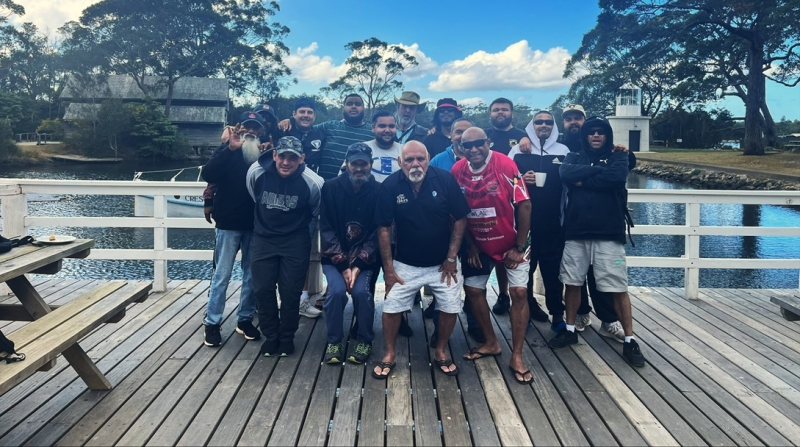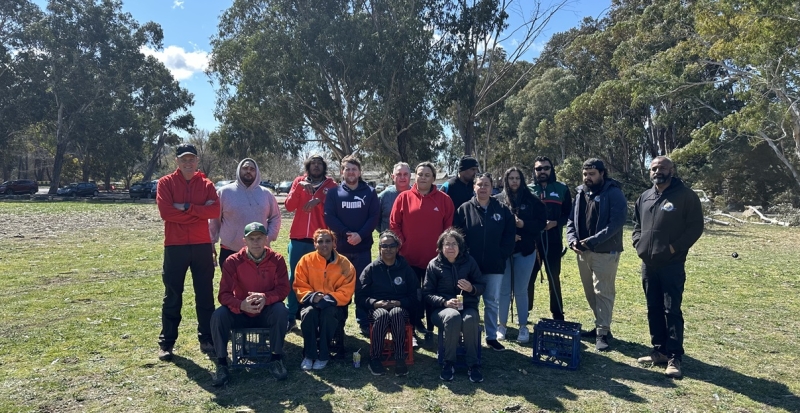A place for second chances
In 2013, Elders in Canberra came together over a shared concern about the services provided to First Nations people leaving prison. The community wanted returning members to have stronger, more culturally responsive support. They wanted people to feel safe so they could learn, work, form connections and, as a result, not reoffend.
So they took the lead on making it happen.

‘It started with conversations with Elders in the community about the justice system,’ explains Deanne Booth, Yeddung Mura Chairperson. ‘There were a number of gaps identified in the community and there also wasn’t a lot of housing for men.’
The community took charge via a group of volunteers and formed Yeddung Mura with a $1,000 donation from the local church. It was a team of people who did it ‘because it was the right thing to do,’ explains Yeddung Mura CEO, Pastor Priestley Obed.
‘When people came out, they had nothing to hold onto. They were turning back into jail in 2 weeks’ time. This was about community. About healing.’
Community grounding
Giving a person ‘something to hold onto’ meant involving them, their families and their communities in working out what that might be. The clients use a workbook developed by Yeddung Mura, filling in their own answers to develop a plan for reintegrating, reconnecting and staying out of prison, with support from community leaders, mentors and others with lived experience. The clients take part voluntarily and are in charge of their plans, supporting ownership and growing leadership for healing and reconnection.
Under Yeddung Mura programs clients and their families address the risk factors of going to prison: alcohol and other drug use and having high mental distress. This supports them to leave prison into safety, where they can complete training, gain a good income and have a permanent home.
The program was the first in the ACT based on the idea of ‘justice reinvestment’, where resources are directed to reduce the causes of crime. This combines with support to meet basic needs, such as accommodation, clothing and food, as the person leaves prison. And because the client has self-determined their plan, and knows they have community support, their chance of reconnecting and not reoffending greatly improves.
‘We strongly believe that success for a client depends on a healthy mind and healthy body,’ says Deanne.
‘Yeddung Mura’s programs are designed to create a positive and supportive environment for individuals struggling with complex issues.
‘Prisoners and their families are characterised by complex needs and high levels of social exclusion. A strong connection to community is critical in supporting the successful reintegration of offenders. When we’re without strong connections, we’re more prone to stress and negative feelings.
‘By having clients participate in sport, music or art, it can foster a sense of belonging, community, leadership, culture and most importantly hope.
‘There are a lot of people willing to help. We’re creating a space for happiness, safe and relaxed. As long as safety is there, people can learn and go on.’
Evolving with growth and change
Yeddung Mura continues as a community-led initiative aimed at reducing recidivism in a culturally responsive way. When it started, a small team volunteered their time. Now more than 15 staff run the programs in partnership with ACT Corrective Services (ACTCS) and the Alexander Maconochie Centre [prison].

Setting up this partnership came from the hard work of the volunteers who showed that the culturally responsive program worked. And they had evidence to show what they did, who they did it with and how long it took them.
‘Because this is community led, we were doing the work with volunteers only,’ says Priestley.
‘Then we developed a software system to measure our time and the activities we do. We developed our systems to record timing – when you start, stop, who you helped and what you helped with. It was all very easy to track the hours, time and quality of work we do. This gives us all the data we need for reporting plus data for the pillars that government identified to tell us the measure for reducing recidivism.’
This was all set up before Yeddung Mura became registered under the CATSI Act in 2014. With the system in place, they could ask funding providers and partners for KPIs – and measure their ability to meet them.
Yeddung Mura has evolved this system along with its governance practices as it has grown and changed. But it remains community-focused, particularly in the way it stays transparent and accountable.
‘All our financials are audited by KPMG and government bodies,’ says Priestley.
‘We also outsource a lot of the things we don’t do, like transporting clients. We use Uber now which saves a lot of time for us. We also outsource our accounting and bookkeeping, and minute taking, which creates transparency and accountability.
‘This leaves us to focus on the people, our clients.’
Yarning with a purpose
When clients choose to engage Yeddung Mura, they access mentors and professionals. Clients also come together as a group to talk about causes of reoffending. Yeddung Mura hosts yarning circles 4 times a week – 2 in the community and 2 in the prison. In yarning circles, clients take the lead on problem-solving on anger management, drug and alcohol recovery and being accountable.
The yarning circle setting is in contrast to a teaching format. It’s delivered in an informal circle where everyone can contribute to the topic, with professional facilitators guiding the group. Yeddung Mura calls it ‘yarning with a purpose’.

A former client described their experience: ‘I can talk to people about my problems, and I want to talk to people who are trying to change. Going to Yeddung Mura lifts my day and I can go there without feeling shame.’
Priestley gives the example of looking at ‘an imaginary case study and the whole group of 15 clients solve the problems for this client.
‘As they’re solving it, they can see the problems in the client story. The group has the power to solve these problems.
‘Also in the yarning circle format, someone will come up and say they were feeling frustrated or angry and the facilitators draw the story out. The workbook has points to cover but the group will fill it in.’
Yeddung Mura’s community-focused format of reducing recidivism has created a safe space for people leaving prison to be healthier, stronger and motivated to succeed. Deanne notes, ‘It’s a lot of the same people coming to the community yarning cirlces, so we must be doing something right, cause they keep coming back.
‘We’re from the community and we treat everyone the same, and as community members we understand what’s needed.’